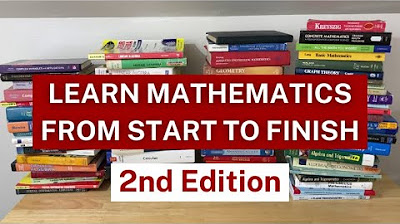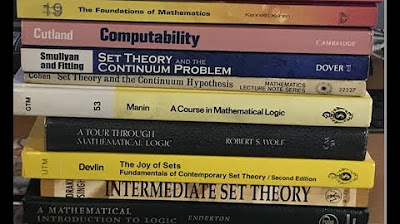Master Mathematics and Become a Wizard
TLDRThe video script outlines a structured approach to mastering mathematics, dividing the learning process into four distinct levels: The Apprentice, The Magician, The Warlock, and The Wizard. Each level builds upon the last, starting with basic mathematics and progressing to advanced topics and proof-based learning. The script emphasizes the importance of foundational knowledge and practice, with recommendations for books at each level to aid in learning. The Apprentice level focuses on computational math, while The Magician begins proof writing. The Warlock tackles undergraduate mathematics, and The Wizard represents the pinnacle of mathematical understanding, where individuals can independently learn and comprehend higher-level mathematics. The script provides a comprehensive list of books for each level, catering to various mathematical subjects from pre-algebra to abstract algebra, analysis, and topology, thus guiding viewers on their journey to becoming a 'mathematical wizard'.
Takeaways
- 📚 The video outlines a structured path to mastering mathematics through four distinct levels: Apprentice, Magician, Warlock, and Wizard.
- 🔢 Level one, the Apprentice, focuses on computational mathematics including pre-algebra, intermediate algebra, college algebra, calculus, trigonometry, and pre-calculus.
- 📝 At the Magician level two, the emphasis shifts to learning how to write mathematical proofs, which is a significant step up in difficulty from computational math.
- 🧙♂️ Level three, known as Warlock, involves delving into undergraduate mathematics and continuing to write proofs, though it can still be challenging.
- 🧙♀️ Level four represents the Wizard, where one can independently learn and understand advanced mathematical concepts and books, signifying a high level of mathematical proficiency.
- 📚 The video recommends various books for each level to help learners progress through the mathematical ranks, starting from pre-algebra workbooks to advanced topics like analysis and topology.
- 💭 The ability to write proofs is a critical skill that enables mathematicians to advance from level two to level three and is essential for higher-level mathematics.
- 📈 The progression through these levels requires increasing exposure to a wide range of mathematical topics, from basic arithmetic to abstract algebra and beyond.
- 🎓 Achieving level four often correlates with obtaining a degree in mathematics, but self-study and dedication can also lead to this high level of mastery.
- 🤔 The video encourages viewers to self-assess and determine which level they are at currently and to set goals for advancement in their mathematical journey.
- 🌐 Online resources, including free books and accessible workbooks, are highlighted as valuable tools for learners at any level to enhance their mathematical skills.
Q & A
What are the four levels of mathematics mastery described in the video?
-The four levels are The Apprentice, focused on basic mathematics; The Magician, learning to write mathematical proofs; The Warlock, learning undergraduate mathematics; and The Wizard, capable of self-studying higher level mathematics and research-level mathematics.
Why is it important to learn how to write mathematical proofs?
-Learning to write mathematical proofs is crucial because it enables a student to progress to higher levels of mathematics, where they can begin to learn a wider range of mathematical topics and concepts.
What is the significance of reaching the Wizard level in mathematics?
-Reaching the Wizard level signifies that an individual has the ability to independently learn and understand complex mathematical concepts from books, which is akin to the level of understanding required for research-level mathematics.
What type of mathematics is covered in the Apprentice level?
-The Apprentice level covers basic mathematics, including pre-algebra, intermediate algebra, college algebra, calculus, trigonometry, and pre-calculus.
What are some recommended books for mastering the Apprentice level of mathematics?
-Some recommended books include 'Essential Pre-Algebra Skills Practice Workbook' by Chris McMullen, 'Everything You Need to Ace Pre-Algebra and Algebra One in One Big Fat Notebook', and 'Pre-Algebra' by Mary H Jonas.
At what level of mathematics does a student start learning undergraduate-level mathematics?
-A student starts learning undergraduate-level mathematics at the Warlock level, which is level three.
What is the role of computational mathematics in the Apprentice level?
-At the Apprentice level, the focus is on computational-based mathematics, which means gaining exposure and practice in performing mathematical calculations without writing proofs.
What is the recommended approach for someone who wants to start learning mathematics from scratch according to the video?
-The recommended approach is to start at the Apprentice level, focusing on basic mathematics and computational skills, using workbooks and books that provide answers to problems for self-study and practice.
What is the main challenge faced by students when they move from the Apprentice level to the Magician level?
-The main challenge is learning to write mathematical proofs, which is a significant step up in complexity from computational mathematics.
What are some of the key subjects covered in level three mathematics, as described in the video?
-Level three mathematics, or the Warlock level, includes subjects such as real analysis, discrete mathematics, abstract algebra, probability, statistics, number theory, and topology.
What does the video suggest for someone who is ready to advance to level four mathematics?
-The video suggests that an individual should have a strong command of proof writing and exposure to advanced topics such as abstract algebra, advanced calculus, linear algebra, topology, and number theory. At this level, one should be able to self-study complex mathematical texts.
Outlines
📚 Mathematics Mastery Levels
The video outlines a four-level framework for mastering mathematics, starting from The Apprentice level, which focuses on basic computational math without proofs, to The Wizard level, where one can self-study advanced mathematics. The Apprentice level includes pre-algebra, intermediate algebra, and other foundational topics. The video suggests books for each level and emphasizes the importance of practice and exposure to mathematical concepts.
📚 Level One: The Basics and Geometry
The video discusses books suitable for Level One, which includes basic mathematics and geometry. It highlights workbooks and textbooks that cover pre-algebra, algebra, and geometry, providing resources for self-study and practice. The recommended books range from modern to classic and collectible editions, catering to different learning styles and preferences.
📚 Level Two: The Magic of Proof Writing
The video moves on to Level Two, where the focus is on learning to write mathematical proofs. It introduces several books that can aid in this transition, from affordable options to free resources available online. The video emphasizes that while this level is challenging, it is a critical step towards mastering higher mathematics.
📚 Level Three: The Warlock's Undergraduate Math
Level Three, known as the Warlock level, involves learning undergraduate mathematics and the ability to write proofs. The video lists numerous books covering a wide range of topics, from real analysis to discrete mathematics,概率论 (probability), and calculus. It suggests that mastering proof writing is essential before delving into these more advanced subjects.
📚 Level Four: The Wizard of Self-Study
The video describes Level Four as the realm of the Wizard, where one can independently learn from any mathematics book. It lists advanced topics and books that one might study at the graduate level or beyond, including measure theory, functional analysis, and differential geometry. The video encourages viewers to aim for this level, indicating that it is achievable with enough exposure and understanding of foundational concepts.
📚 Becoming a Mathematical Wizard
The video concludes by encouraging viewers to assess their current level of mathematical understanding and to strive towards becoming a mathematical wizard. It suggests that with dedication and the right resources, anyone can progress through the levels and master higher mathematics.
Mindmap
Keywords
💡Apprentice
💡Magician
💡Warlock
💡Wizard
💡Mathematical proofs
💡Undergraduate mathematics
💡Research level mathematics
💡Pre-algebra
💡Self-study
💡Proof-based exercises
Highlights
The video outlines a four-level framework to become a mathematical wizard, starting from basic mathematics to research-level proficiency.
At the Apprentice level, focus is on computational mathematics without the need to write proofs.
The Magician level involves learning to write mathematical proofs, which is a challenging but crucial step.
Warlocks, at level three, learn undergraduate mathematics and have the ability to write proofs, though they may still encounter doubts.
Wizards, at the highest level, can independently learn and understand advanced mathematical concepts from books.
The video recommends specific books for mastering each level, starting with 'Essential Pre-Algebra Skills Practice Workbook' for Apprentices.
For those returning to mathematics, pre-algebra is a good starting point with books like 'Everything You Need to Ace Pre-Algebra'.
Geometry is covered with books such as 'Sean's Outline of Geometry' for a comprehensive reference.
The video emphasizes the importance of practice and exposure to build a strong foundation in basic mathematics.
Statistics and probability are introduced as part of level one mathematics with books like 'Elementary Statistics' by Lang.
The video provides a list of books for self-study in various mathematical subjects, including trigonometry and calculus.
Level two mathematics involves transitioning to proof-based learning, with books like 'Mathematical Proofs' aiding in the process.
The video suggests that most people never reach level two mathematics, which is typically reserved for math majors.
For those progressing to level three, mastering proof writing is essential, and the video recommends 'How to Prove It' as a top choice.
Level three, the Warlock level, involves learning a wide range of undergraduate mathematics with the ability to write proofs.
The video highlights the accessibility of certain books, such as 'Real Analysis' by Jay Cummings, for those ready to delve into more advanced topics.
Level four mathematics is aimed at those who can self-study and understand graduate-level mathematics, with books like 'Measure Theory' by Halmos.
The speaker encourages viewers to determine their current mathematical level and use the video's resources to advance.
The video concludes with an encouragement for viewers to pursue their journey to become mathematical wizards through dedicated study and practice.
Transcripts
5.0 / 5 (0 votes)
Thanks for rating:





